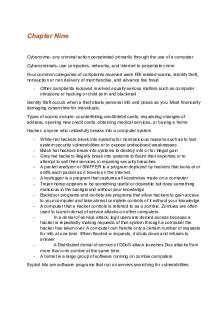Chap 9 - Chapter 9: Deviance - Introduction to Sociology 2e PDF

| Title | Chap 9 - Chapter 9: Deviance - Introduction to Sociology 2e |
|---|---|
| Author | Allison Gutierrez |
| Course | Sociology |
| Institution | High School - USA |
| Pages | 2 |
| File Size | 77.7 KB |
| File Type | |
| Total Downloads | 102 |
| Total Views | 151 |
Summary
Chapter 9: Deviance...
Description
Chapter Evaluation form
Introductory Sociology
After my reading of the Chapter 9: Deviance 1. I have learned …. in this chapter I learned about deviance and its many theories. Deviance is when someone's action or behavior violates the cultural norms. An example would be committing crimes or drinking while driving. Some theories include the biological theory (explain human behavior as result of instincts), psychological theory (unsuccessful socialization), and sociological theories (behavior/ deviance as products of society).
2. I was surprised to know… about white collar crime which is crimes committed by people of high power based their occupations which don't involve in violence. When taken to court they occur in government offices or corporate boardrooms like sociologist say “crime in the suites.” Usually white collar crime criminals escape punishment and are just charged. When someone loses the case they can just easily pay and are not labeled as a criminal.
3. I see how the chapter information relates to my life… by community based corrections which is programs that lower the cost of supervising people convicted of crimes and reduce overcrowding of prisons. I did not go through this but one of my uncle's at the moment is under probation and he is under regular supervisions. Currently he is working, does drug testing, and checks in with his probation officer. Sometimes I even help him turn in paperwork to his probation officer online such as tax work, contact information, and current car being driven by him.
Discussion topic: According to Robert Merton's strain theory, what are the four deviant responses by individuals to dominant cultural patterns when there is a gap between means and goals? Provide an illustration of each.
1. Innovation- the lack of opportunities to get wealthy may engage the poor in criminal activities instead of working hard to achieve wealth 2. Ritualism- can't achieve goal, some might not care about wealth but still respect society norms 3. Retreatism- dropping out of cultural goals, an example, would be alcoholics in which they just let their lives be this way 4. Rebellion- reject success and the means of achieving it, form a counterculture supporting alternatives to the existing social order...
Similar Free PDFs

Chapter 9 - Chap 9
- 5 Pages

Chapter 9: Deviance - Lucianno
- 18 Pages

Chapter 9 What is Deviance
- 5 Pages

Sociology Chapter 9
- 3 Pages

Introduction to Tally.ERP 9
- 38 Pages

Unit 9 - Introduction to Psychology
- 21 Pages

Sociology notes on deviance
- 18 Pages
Popular Institutions
- Tinajero National High School - Annex
- Politeknik Caltex Riau
- Yokohama City University
- SGT University
- University of Al-Qadisiyah
- Divine Word College of Vigan
- Techniek College Rotterdam
- Universidade de Santiago
- Universiti Teknologi MARA Cawangan Johor Kampus Pasir Gudang
- Poltekkes Kemenkes Yogyakarta
- Baguio City National High School
- Colegio san marcos
- preparatoria uno
- Centro de Bachillerato Tecnológico Industrial y de Servicios No. 107
- Dalian Maritime University
- Quang Trung Secondary School
- Colegio Tecnológico en Informática
- Corporación Regional de Educación Superior
- Grupo CEDVA
- Dar Al Uloom University
- Centro de Estudios Preuniversitarios de la Universidad Nacional de Ingeniería
- 上智大学
- Aakash International School, Nuna Majara
- San Felipe Neri Catholic School
- Kang Chiao International School - New Taipei City
- Misamis Occidental National High School
- Institución Educativa Escuela Normal Juan Ladrilleros
- Kolehiyo ng Pantukan
- Batanes State College
- Instituto Continental
- Sekolah Menengah Kejuruan Kesehatan Kaltara (Tarakan)
- Colegio de La Inmaculada Concepcion - Cebu








